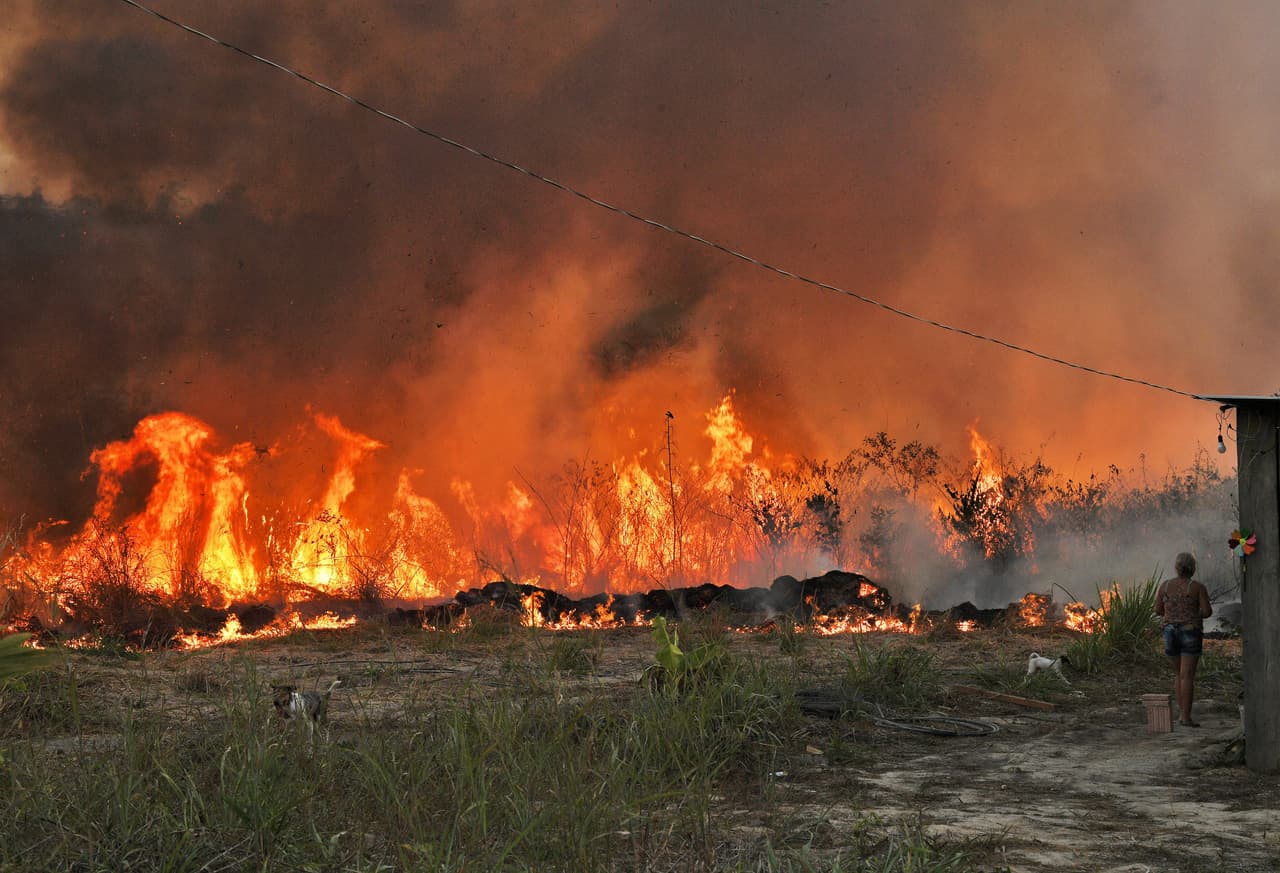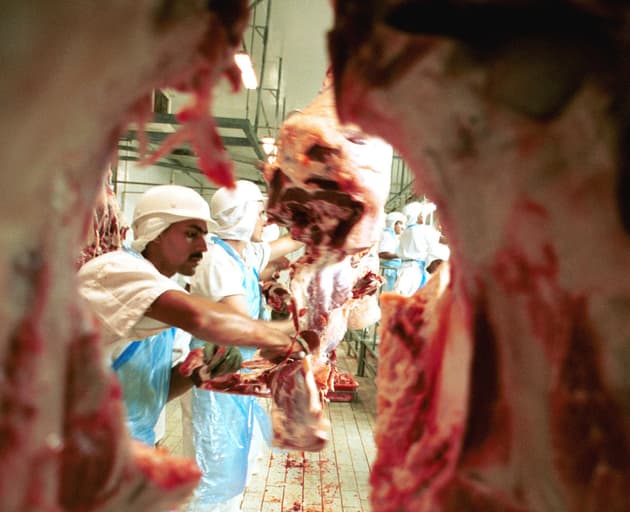
Reign of fire: blazes surge on ‘protected’ Amazon land under Bolsonaro
Devastating fires on legally protected land in the Amazon rainforest have surged under Brazilian president Jair Bolsonaro, the Bureau can reveal.
Satellite mapping of blazes and data on unlawful deforestation show the number of major fires on embargoed rural land increased from 77 in 2018, immediately before Bolsonaro took office, to 124 in 2020.
The Bureau’s investigation also found that beef from farmers accused of illegal deforestation – and subsequently sanctioned with embargoes – has still been making its way into global supply chains, including those serving at least two of the world’s biggest meat companies, JBS and Marfrig.
Embargoes imposed by Brazil’s environment agency are intended to penalise landowners and allow illegally cleared forest areas to recover. JBS and other major Brazilian meat producers have made commitments not to buy cattle from protected land.
But in one case involving a farmer doing business with the companies, multiple fires were recorded on land that had been embargoed after earlier deforestation.
The Bureau tracked cattle supplied by the farmer implicated in this deforestation to abattoirs run by JBS and Marfrig. The Marfrig abattoir has exported beef to the UK.
The findings raise serious questions about the effectiveness and enforcement of the embargo system and undermine the “deforestation-free” claims of multinational meat companies and their international customers.
Exploiting the Earth
The burning of the Amazon has become a global political issue, with Brazil pledging to strengthen environmental enforcement under pressure from the US government. In the UK, the environment bill going through parliament will require companies to ensure their supply chains are free of links to deforestation.
Bolsonaro, who took office in 2019, has backed commercial exploitation of the world’s largest rainforest.
Under his administration, Brazil’s environment agency has issued fewer embargoes, sanctioning just 385 areas in the Amazon in 2020, compared with more than 2,500 in 2018. The area of land under embargo has remained roughly the same.
 Bolsonaro has backed the commercial exploitation of the Amazon
Horacio Villalobos/Corbis via Getty
Bolsonaro has backed the commercial exploitation of the Amazon
Horacio Villalobos/Corbis via Getty
The number of fines issued for illegal burning and deforestation in the Amazon has plummeted, dropping from an average of 4,600 a year between 2012 and 2018 to 2,600 a year in 2019 and 2020.
Even before Bolsonaro came to power, fires on embargoed land were a problem. There were 243 major blazes in protected areas of the Amazon in 2015 – the worst recent year.
The number of such fires subsequently declined, but the destruction has now ramped up again. Experts fear this year’s dry weather could increase the risk of severe blazes when the fire season peaks in August and September.
Repeat offenders
The Bureau has established that Brazilian meat giants sourced hundreds of cattle from Vilymar Bissoni, a farmer who has been linked to repeated cases of deforestation resulting in multiple embargoes in Mato Grosso state, a major centre for beef and soy production.
Make change possible
Investigative journalism is vital for democracy. Help us to expose injustice and spark change
Click here to support usRecords seen by the Bureau and Repórter Brasil show that between them JBS and Marfrig bought nearly 1,000 cattle from Bissoni over 15 months in 2018 and 2019. Bissoni owns a company with a shareholding in the agribusiness Bissoni Agropecuária.
Bissoni Agropecuária and related companies run a sprawling network of farms in the municipality of Gaúcha do Norte, with more than 350 sq km of land producing soy and other crops and a beef enterprise with at least 7,000 cattle.
Bissoni and other family members connected with the business have been the subject of five environmental embargoes issued between 2009 and 2017, according to public records. At least three, spanning more than 26 sq km, were linked to illegal deforestation. Unlawful clearing linked to the family business has also resulted in fines totalling more than $1m.
The Bureau has established that at least three fires – in 2015, 2018 and 2020 – broke out within the perimeters of two of these embargoed areas, after the sanctions were imposed. When approached by the Bureau, the company denied these were deliberately set.
Recent satellite images reveal how 6 sq km of forest was destroyed in the vicinity of another farm, Fazenda Vó Jovita, linked to Bissoni Agropecuária in September 2020. Fires were recorded at this property – which is not currently under embargo – in the same month.
The company told the Bureau: “There was a fire in the indigenous land and in neighbouring areas. We were successful in fighting the fire before it entered our property.” Satellite images show fires on the property.
Records seen by the Bureau reveal that cattle were repeatedly transported from Fazenda Vó Jovita to abattoirs supplying Marfrig and JBS between 2018 and 2019.
The Marfrig meat plant that slaughtered the Bissoni cattle had exported products to the UK, highlighting how British consumption of Brazilian beef could inadvertently be helping to drive rainforest destruction thousands of miles away.
The Bureau has learnt that UK meat wholesalers were among the companies importing Marfrig beef from its Paranatinga plant.
JBS and Marfrig’s UK customers include Sainsbury’s, Asda, Lidl and other major supermarkets as well as wholesalers, some of which supply the NHS.
JBS did not deny doing business with Vilymar Bissoni but said Fazenda Vó Jovita did not correspond with any farm listed on its supplier system. The company said: “JBS does not tolerate any illegal deforestation in the Amazon or other biomes.”
Marfrig confirmed that Bissoni had been a supplier to one of its slaughterhouses, but said the farmer was no longer on its supplier list. The company said the farmer was “fully compliant” with its rules for suppliers at the time of the transactions.
The company said it was committed to zero deforestation in the Amazon biome by 2025 and had introduced a system for monitoring cattle suppliers to reduce the possibility of transferring cattle from “irregular” areas to areas that are in compliance.
 Workers process beef at a cold storage plant in Brazil
Paulo Fridman/Bloomberg via Getty Images
Workers process beef at a cold storage plant in Brazil
Paulo Fridman/Bloomberg via Getty Images
Asda said it would stop stocking JBS Brazilian beef in its “newly sourced” canned goods.
“We have worked with our supplier to ensure that any newly sourced canned products do not contain any Brazilian beef from JBS by the end of 2021,” an Asda spokesperson said, adding the business is committed to stopping food production linked to deforestation.
In a statement, Sainsbury’s told the Bureau that it is “committed to sourcing sustainably and working together with Global Witness” to tackle deforestation and preserve ecosystems in the Amazon and the Cerrado. Global Witness disputes this statement and says it has no working relationship with Sainsbury’s.
The NHS said its food buying followed government standards for environmental protection, and that it has asked for sustainability strategies from all suppliers for its procurements since last year.
Lidl referred to a retail industry statement, which said: “Our members take every effort to ensure the products they sell have no links to deforestation.”
Note: This story was updated on Friday August 6 to reflect Global Witness's denial of working with Sainsbury's.
Reporters: Elisângela Mendonça and Andrew Wasley
Data analysis: Charles Boutaud
Environment editor: Jeevan Vasagar
Investigations editor: Meirion Jones
Production editors: Alex Hess and Emily Goddard
Impact producer: Grace Murray
Fact checker: Vicky Gayle
Legal team: Stephen Shotnes (Simons Muirhead Burton)
Our Food and Farming project is partly funded out of Bureau core funds and partly by the Hollick Family Foundation (for 2020) and The Guardian. None of our funders have any influence over the Bureau’s editorial decisions or output.
Header image: Fires burning on farmland in the Amazon. Credit: Carl De Souza/AFP via Getty
-
Area:
-
Subject:







